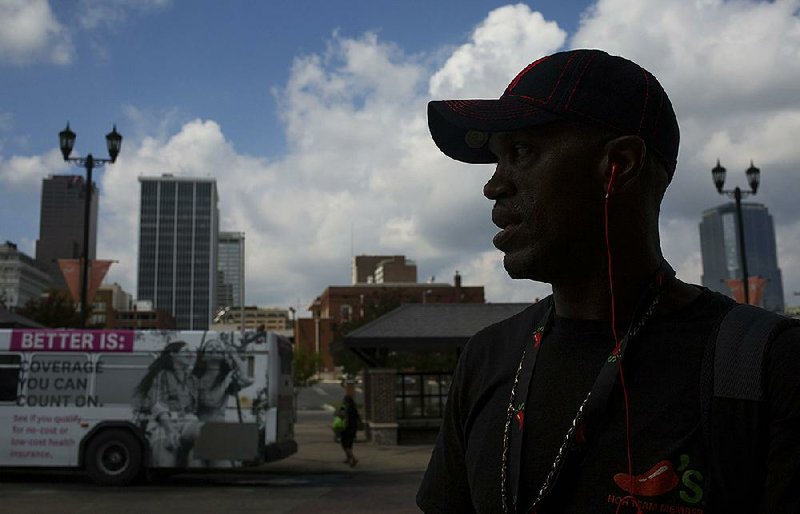Parolees must get a job as one of the conditions to be released from prison. Alvertis Murry, 44, has had several since wrapping up a 21-year stretch in prison two years ago.
But even when he gets a job, it isn't easy for Murry, and many other parolees, to get to the job. Murry said he wants to help change that, and he has asked Rock Region Metro, the transit agency for Pulaski County, to help.
Until recently, Murry lived in the Dixie Addition, a small, impoverished neighborhood on the east side of North Little Rock that his family has called home for a long time. It is 13.6 miles from his job at Chili's Grill and Bar on North Rodney Parham Road in Little Rock.
For people who have their own vehicles, it is a 20-minute commute.
But Murry isn't one of those people. Nor are the people in the Dixie Addition, he said. He used a couple of Rock Region Metro bus routes to get to work, which stretches the commute to closer to 40 minutes. But his job as a dishwasher didn't end until 1:30 a.m., long after bus service ended.
Sometimes someone he knows might be up at that hour and will pick him up, he said. Most of the time, though, Murry walks -- all the way to the River Cities Travel Center, the main Rock Region bus station in downtown Little Rock.
The nine-mile hike takes about three hours. He would catch the bus home when service resumed at 5 a.m.
"That was my whole year," Murry said.
Murry said the hike to keep a job to help, among other things, afford the $35 monthly fee all parolees start out paying is part of a simple but unforgiving equation for him and many other parolees as soon as they begin life on the outside: Housing, work and transportation equals anxiety.
"It's a lot of pressure," he said.
Even two years later, he said he continues to feel the stress of everyday life. Murry still works at Chili's part time, but he works mornings now, six days a week. He has his own apartment and carefully budgets his money to cover the rent, food, bus fare and laundry, with little left over.
But he said his time in prison left him a lot of time to read, think and mature. On the inside, he said he saw too many people return to prison because of anxieties involving housing, work and transportation, as well as for other reasons.
He said it is difficult for many parolees because they return to the same environment they left, which is exactly what Murry did. The same dysfunctional family relationship, the same neighborhood that spawned two aggravated robberies to which he admitted to playing a role, including one in which the robbery victim was shot.
"You have to change people, places and things," he said.
Which is why Murry said he moved into his own apartment and away from his old neighborhood and the people who are still there from more than 20 years ago. It is all part of what he says he learned in prison, which began at 19 after he pleaded guilty on Election Day 1992 when Bill Clinton won his first term in the White House. That knowledge has allowed him to go from monthly contact with his parole officer to annual contact. And he no longer pays a $35 monthly fee; the fee is $70 a year now.
Murry also said he has ambitions to begin a nonprofit organization to help people like himself and share what he learned. He has developed a step-by-step plan to mentor people who want help, has acquired a building and plans to hold sessions beginning later this fall.
But transportation remains a challenge for parolees like himself. Rock Region can help, he said. Murry has asked Rock Region to explore the possibility of providing a bus pass for up to a year for parolees to help with the transition from life in prison to life on the outside and ease their anxiety.
He mentioned it in a brief presentation he helped give last month to the Rock Region board. It was part of a larger effort to save service to his old Dixie Addition neighborhood, an effort led by state Sen. Linda Chesterfield, D-Little Rock, and another former state senator, Tracy Steele.
Direct service to the neighborhood would have been eliminated as part of plans by the Pulaski County transit agency to tweak more than half the system's regular routes to improve efficiency.
The neighborhood is boxed in on three sides. It sits off East Broadway, but residents must cross three railroad tracks to reach it.
The board voted to keep the route into Dixie Addition with a pledge from neighborhood supporters to help promote increased ridership on the route.
Murry also described the challenges he and other parolees face in getting a job and holding onto it in asking for the agency to help parolees with transportation. The bus can be their lifeline until they get settled, he said.
"He says it the way it really is," said Allie Freeman, the board chairman who is a former member of the Arkansas Parole Board. "That's the real truth out there."
Another board member, Little Rock City Manager Bruce Moore, asked the transit agency's staff to look into Murry's request to provide parolees bus passes for a year upon their release. A monthly adult pass costs $36.
As of last week, the agency staff was reviewing the request.
"We are currently researching government agencies and nonprofits who provide re-entry services so we can determine interest in potential partnerships and make sure their front-line employees are familiar with our services," said Becca Green, public engagement director for Rock Region. "We also hope to get a better sense of whether a program as Mr. Murry suggested would get used, and if so, how often."
Metro on 09/12/2016

